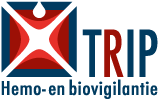Hemovigilance reporting procedure
Reporting of transfusion reactions, errors and incidents to TRIP is voluntary in principle but is regarded as the professional norm. Reporting is anonymous as to patients and treating clinicians.
In the framework of compulsory reporting under the European directive 2002/98/EC and the additional directive 2005/61/EC, TRIP analyses and supplies an annual overview of serious adverse reactions (grade 2 or higher) and events involving blood components for the European Commission on behalf of the Healthcare Inspectorate (Inspectie voor de gezondheidszorg, IGZ). The reporter can directly make a report available to the IGZ and/or the blood supply organisation Sanquin via the TRIP digital reporting system.
Who
- The hospital submits a report if a reaction or incident has been noted in the hospital.
- Sanquin Blood Supply provides information to TRIP about serious adverse reactions which have been reported to Sanquin, as well as summary information regarding findings of bacterial screening of platelet concentrates and look-back investigations.
- TRIP annually for double reporting by comparing blood component numbers and patients’ dates of birth.
The persons responsible in hospitals are
Hemovigilance officer
Staff member officially responsible for reporting to TRIP, nominated by the blood transfusion committee and preferably officially appointed by the hospital board
Hemovigilance assistant (Transfusion safety officer)
Prepares the reports to TRIP (visits ward, collects and collates information), assists the hemovigilance officer and provides education and training on blood transfusion.
What
Transfusion Reactions and incidents in the transfusion chain
Categories of reactions and incidents that are to be reported to TRIP (definitons)
How
How to report
Hospital contact persons report to TRIP via a secure online reporting form. TRIP physicians assess all reports and may ask questions for clarification using the reporting module.
Report to TRIP
- A preliminary report can be submitted before conclusion of investigations.
- Use the digital reporting form to make serious (Grade 2 or higher) reports available to the Healthcare Inspectorate and reports which may be related to blood component quality/safety to Sanquin Blood Supply.
Communication with hospitals
- Each year hospitals are asked to provide information about numbers of units transfused and whether all relevant reports have been sent to TRIP. Those without reports are asked confirm that there was ‘nil to report’ in the TRIP categories.
- A certificate of participation is sent to hospitals which have provided information about transfused units and about reportable reactions/events.
Annual Report
An Expert Committee of transfusion experts from different professional backgrounds assesses all serious reports and examines a sample of the non-serious reports.
The annual hemovigilance report in an extended version with analyses and recommendations is publicly available on the TRIP website in English as well as Dutch. A shorter (Dutch) print version, presenting the main hemovigilance and biovigilance findings, is circulated widely sent to the professionals of the transfusion and transplantation chains, governing boards of the hospitals, tissue establishments, the Ministry of Health and the Inspectorate.
